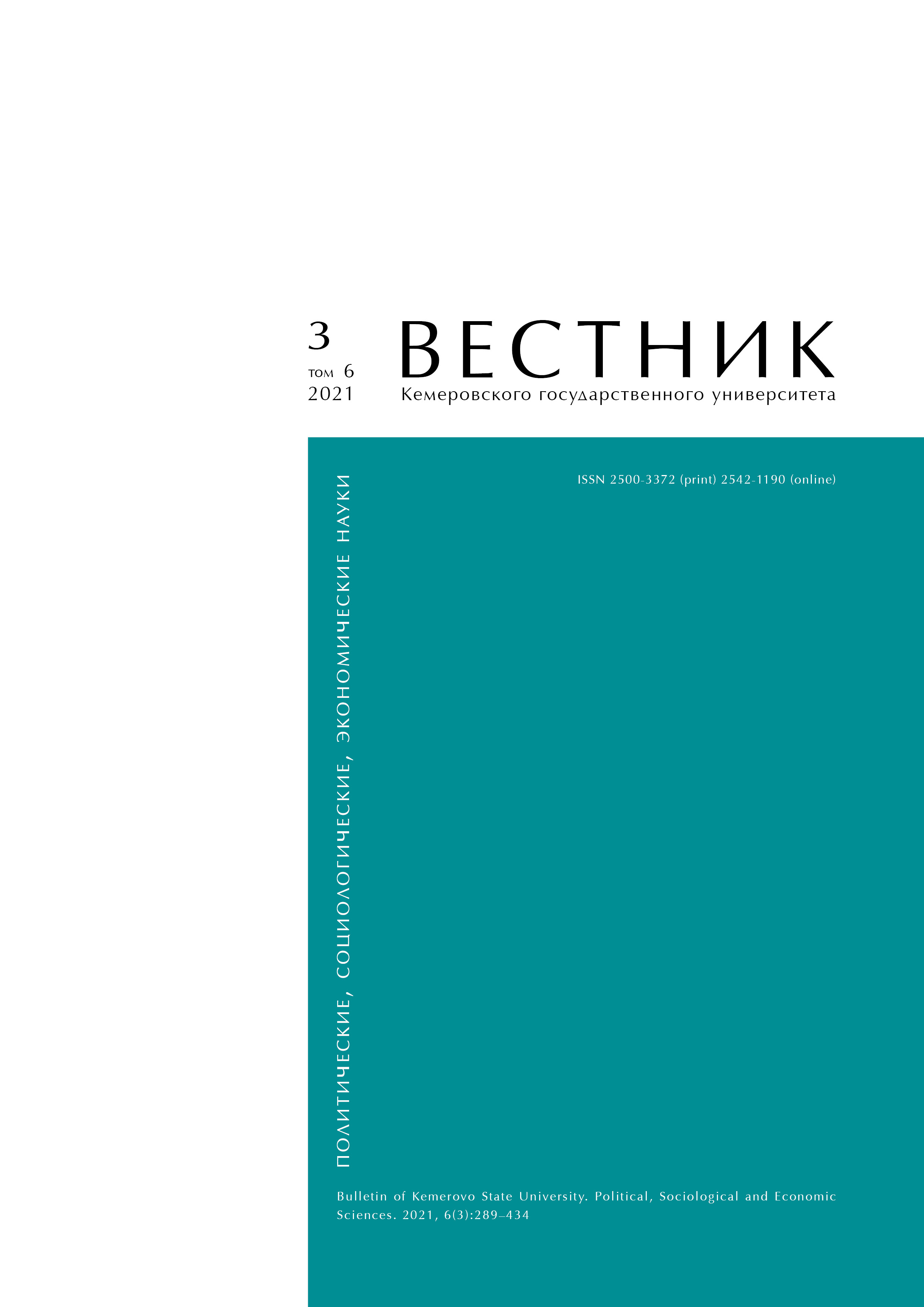с 01.01.2006 по настоящее время
Ульяновск, Россия
УДК 33 Экономика. Экономические науки
Исследование посвящено изучению причин завершения предпринимателями своей деятельности. В последние годы ситуация обострилась в связи с отрицательным влиянием последствий пандемии COVID-19 на экономические показатели большинства субъектов малого и среднего предпринимательства по различным странам. Цель – оценка сложившихся в 2020 году показателей, характеризующих причины завершения предпринимателями своей деятельности в современных национальных экономиках. Методология основывалась на разработке экономико-математических моделей, представляющих собой функции нормального распределения. Исходными эмпирическими данными являлись результаты опроса предпринимателей (их мнения о причинах завершения деятельности) по 39 странам при проведении работ по проекту «Глобальный мониторинг предпринимательства». Оценены четыре показателя, определяющие положительные и негативные причины завершения предпринимателями своей деятельности. Приведена принципиально новая информация о влиянии пандемии COVID-19 на этот процесс. Доказано, что большинство (56,3 %) предпринимателей окончили деятельность по негативным причинам, однако не связанным с пандемией COVID-19; более четверти (почти 28 %) предпринимателей – в связи с негативными последствиями пандемии. По позитивным причинам завершил деятельность только каждый шестой предприниматель. Дальнейшие исследования могут быть связаны с оценкой последствий пандемии в 2021 году.
предпринимательство, выход из бизнеса, пандемия COVID-19, опрос предпринимателей, Глобальный мониторинг предпринимательства, функции нормального распределения
1. Lattacher W., Wdowiak M. A. Entrepreneurial learning from failure. A systematic review // International Journal of Entrepreneurial Behavior & Research. 2020. Vol. 26. № 5. P. 1093-1131. https://doi.org/10.1108/IJEBR-02-2019-0085
2. He V. F., Sirén C., Singh S., Solomon G., Krogh G. von. Keep calm and carry on: emotion regulation in entrepreneurs' learning from failure // Entrepreneurship Theory and Practice. 2018. Vol. 42. № 4. P. 605-630. https://doi.org/10.1177/1042258718783428
3. Espinoza-Benavides J., Díaz D. The entrepreneurial profile after failure // International Journal of Entrepreneurial Behavior & Research. 2019. Vol. 25. № 8. P. 1634-1651. https://doi.org/10.1108/IJEBR-04-2018-0242
4. Ucbasaran D., Westhead P., Wright M., Flores M. The nature of entrepreneurial experience, business failure and comparative optimism // Journal of Business Venturing. 2010. Vol. 25. № 6. P. 541-555. https://doi.org/10.1016/j.jbusvent.2009.04.001
5. Singh S., Corner P. D., Pavlovich K. Failed, not finished: a narrative approach to understanding venture failure stigmatization // Journal of Business Venturing. 2015. Vol. 30. № 1. P. 150-166. https://doi.org/10.1016/j.jbusvent.2014.07.005
6. Yamakawa Y., Peng M. W., Deeds D. L. Rising from the ashes: cognitive determinants of venture growth after entrepreneurial failure // Entrepreneurship Theory and Practice. 2015. Vol. 39. № 2. P. 209-236. https://doi.org/10.1111/etap.12047
7. Jenkins A., McKelvie A. What is entrepreneurial failure? Implications for future research // International Small Business Journal. 2016. Vol. 34. № 2. P. 176-188. https://doi.org/10.1177/0266242615574011
8. Cucinotta D., Vanelli M. WHO declares COVID-19 a pandemic // Acta Biomed. 2020. Vol. 91. № 1. P. 157-160. https://doi.org/10.23750/abm.v91i1.9397
9. Носачевская Е. А. Об актуальных вопросах развития российской экономики с учетом последствий пандемии коронавируса COVID-19 // Евразийское Научное Объединение. 2020. № 7-4. С. 235-239.
10. Martin A., Markhvida M., Hallegatte S., Walsh B. Socio-economic impacts of COVID-19 on household consumption and poverty // Economics of Disasters and Climate Change. 2020. Vol. 4. № 3. P. 453-479. https://doi.org/10.1007/s41885-020-00070-3
11. Murakami E., Shimizutani S., Yamada E. Projection of the effects of the COVID-19 pandemic on the welfare of remittance-dependent households in the Philippines // Economics of Disasters and Climate Change. 2021. Vol. 5. № 1. P. 97-110. https://doi.org/10.1007/s41885-020-00078-9
12. Fuente A. de la. The economic consequences of Covid in Spain and how to deal with them // Applied Economic Analysis. 2021. Vol. 29. № 85. P. 90-104. https://doi.org/10.1108/AEA-11-2020-0158
13. Nicola M., Alsafi Z., Sohrabi C., Kerwan A., Al-Jabir A., Iosifidis C., Agha M., Agha R. The socio-economic implications of the coronavirus pandemic (COVID-19): a review // International Journal of Surgery. 2020. Vol. 78. P. 185-193. https://doi.org/10.1016/j.ijsu.2020.04.018
14. Siche R. What is the impact of COVID-19 disease on agriculture? // Scientia Agropecuaria. 2020. Vol. 11. № 1. P. 3-6. http://dx.doi.org/10.17268/sci.agropecu.2020.01.00
15. Головнин М. Ю., Никитина С. А. Каналы воздействия пандемии COVID-19 на экономику России // Вестник Института экономики Российской академии наук. 2020. № 5. C. 9-23. http://dx.doi.org/10.24411/2073-6487-2020-10053
16. Buheji M., Cunha K. da C., Godfred B., Mavrić B., Souza Y. L. do C. de, Silva S. S. da C., Hanafi M., Yein T. C. The extent of COVID-19 pandemic socio-economic impact on global poverty. A global integrative multidisciplinary review // American Journal of Economics. 2020. Vol. 10. № 4. P. 213-224. http://dx.doi.org/10.5923/j.economics.20201004.02
17. Adam N. A., Alarifi G. Innovation practices for survival of small and medium enterprises (SMEs) in the COVID-19 times: the role of external support // Journal of Innovation and Entrepreneurship. 2021. Vol. 10. № 15. P. 1-22. https://doi.org/10.1186/s13731-021-00156-6
18. Crane L. D., Decker R. A., Flaaen A., Hamins-Puertolas A., Kurz C. Business exit during the COVID-19 pandemic: non-traditional measures in historical context // Finance and Economics Discussion Series 2020-089. 2021. 58 p. https://doi.org/10.17016/FEDS.2020.089r1
19. Vitenu-Sackey P. A., Barfi R. The impact of Covid-19 pandemic on the global economy: emphasis on poverty alleviation and economic growth // The Economics and Finance Letters. 2021. Vol. 8. № 1. P. 32-43. https://doi.org/10.18488/journal.29.2021.81.32.43
20. Peters B. Early exits: exit strategies for entrepreneurs and angel investors (but maybe not venture capitalists). Vancouver: Meteor Bytes Data Management Corp., 2009. 195 p.
21. DeTienne D. R. Entrepreneurial exit as a critical component of the entrepreneurial process: theoretical development // Journal of Business Venturing. 2010. Vol. 25 № 2. P. 203-215. https://doi.org/10.1016/j.jbusvent.2008.05.004
22. Cefis E., Marsili O. Born to flip. Exit decisions of entrepreneurial firms in high-tech and low-tech industries // Journal of Evolutionary Economics. 2011. Vol. 21. № 3. P. 473-498. https://doi.org/10.1007/s00191-010-0210-4
23. Deenitchin I., Pikul P. Entrepreneurship: how to design growth and exit strategy // Economics and Business Review EBR. 2005. Vol. 5. № 2. P. 25-43.
24. Wennberg K. J., DeTienne D. R. What do we really mean when we talk about 'exit'? A critical review of research on entrepreneurial exit // International Small Business Journal. 2014. Vol. 32. № 1. P. 4-16. https://doi.org/10.1177/0266242613517126
25. Con Foo H. R. E., Breen J. P. Successful exit processes of SMEs in Australia // SEAANZ 2009: Proc. 22nd annual Conf. of the Small Enterprise Association of Australia and New Zealand (Wellington, 31 Aug - 2 Sep 2009) Wellington: Massey University, 2009. 28 p.
26. Cumming D. Contracts and exits in venture capital finance // The Review of Financial Studies. 2008. Vol. 21. № 5. P. 1947-1982. https://doi.org/10.1093/rfs/hhn072
27. Teeffelen L. van, Uhlaner L. M. Firm resource characteristics and human capital as predictors of exit choice: an exploratory study of SMEs // Entrepreneurship Research Journal. 2013. Vol. 3. № 1. P. 84-108. https://doi.org/10.1515/erj-2012-0008
28. Marjański A., Sułkowski Ł. The evolution of family entrepreneurship in Poland: main findings based on surveys and interviews from 2009-2018 // Entrepreneurial Business and Economics Review. 2019. Vol. 7. № 1. P. 95-116. https://doi.org/10.15678/EBER.2019.070106
29. Sharma P., Chrisman J. J., Chua J. H. Predictors of satisfaction with the succession process in family firms // Journal of Business Venturing. 2003. Vol. 18. № 5. P. 667-687. https://doi.org/10.1016/S0883-9026(03)00015-6
30. DeTienne D. R., Cardon M. S. Impact of founder experience on exit intentions // Small Business Economics. 2012. Vol. 38. № 4. P. 351-374. https://doi.org/10.1007/s11187-010-9284-5
31. Egeln J., Falk U., Heger D., Höwer D., Metzger G. Ursachen für das scheitern junger unternehmen in den ersten fünf jahren ihres bestehens // EconStor. 2010. 110 p.
32. Aldrich H. E. Perpetually on the eve of destruction? Understanding exits in capitalist societies at multiple levels of analysis // Research Handbook of Entrepreneurial Exit / eds. D. R. DeTienne, K. J. Wennberg. Сheltenham; Northampton, MA: Edward Elgar Publishing, 2015. P. 11-41. https://doi.org/10.4337/9781782546979
33. Stokes D., Blackburn R. A. Learning the hard way: the lessons of owner-managers who have closed their businesses // Journal of Small Business and Enterprise Development. 2002. Vol. 9. № 1. P. 17-27. https://doi.org/10.1108/14626000210419455
34. Parastuty Z., Breitenecker R. J., Schwarz E. J., Harms R. Exploring the reasons and ways to exit: the entrepreneur perspective // Contemporary Entrepreneurship: Multidisciplinary Perspectives on Innovation and Growth / eds. D. Bögenhold, J. Bonnet, M. Dejardin, D. G. P. de Lema. Cham: Springer, 2016. P. 159-172. https://doi.org/10.1007/978-3-319-28134-6_10
35. Cardon M. S., Stevens С. E., Potter D. R. Misfortunes or mistakes? Cultural sensemaking of entrepreneurial failure // Journal of Business Venturing. 2011. Vol. 26. № 1. P. 79-92. https://doi.org/10.1016/j.jbusvent.2009.06.004
36. Stokes D. R. Small Business Management. 4th ed. London: Continuum International Publishing Group, 2002. 413 p.
37. Ucbasaran D., Shepherd D. A., Lockett A., Lyon S. J. Life after business failure: the process and consequences of business failure for entrepreneurs // Journal of Management. 2013. Vol. 39. № 1. P. 163-202. https://doi.org/10.1177/0149206312457823
38. Пиньковецкая Ю. С. Моделирование показателей деятельности малого и среднего предпринимательства в регионах с использованием функции плотности нормального распределения // Проблемы развития территории. 2015. № 6. С. 93-107.
39. Pinkovetskaia Iu. S., Nuretdinova Yu. V., Nuretdinov I. G., Lipatova N. N. Mathematical modeling on the base of functions density of normal distribution // Revista de la Universidad del Zulia. 2021. Vol. 12. № 33. P. 34-49. http://dx.doi.org/10.46925//rdluz.33.04
40. Пиньковецкая Ю. С. Гендерные различия предпринимателей, специализирующихся на торговле и информационных технологиях // Вестник Кемеровского государственного университета. Серия: Политические, социологические и экономические науки. 2021. Т. 6. № 2. С. 248-255. https://doi.org/10.21603/2500-3372-2021-6-2-248-255

















